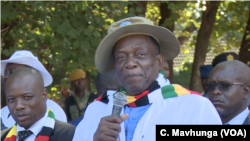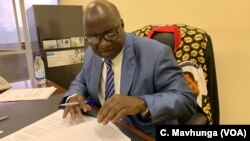Columbus Mavhunga
In Zimbabwe, white farmers whose land was taken by the government are cautiously hopeful about a promise from President Emmerson Mnangagwa to give them at least partial repayment. The promise came a few days before Zimbabwe celebrates 39 years of independence.
On Sunday, state media quoted President Mnangagwa promising partial compensation for white commercial farmers whose land was seized under former president Robert Mugabe and redistributed to blacks.
He said the government would pay for improvements to the land, such as buildings or dams.
Ex-farmers are now submitting requests for compensation at the offices of the Zimbabwe Commercial Farmers Union.
One of them is Glen Johnston, whose mother, Agnes, was displaced from her farm about 17 years ago. Since then, she has been living in Harare with her son.
Johnston says he is taking the president’s promise with caution.
“Basically, it looks like we’ve been promised that we have steps to be taken. So now, taking the steps, will we get the money at the end of the day? Obviously time will tell,” he said.
The land seizures began in 2000 with the backing of Mugabe, who said they would correct colonial imbalances. Farm production plunged, and critics blamed the seizures for the collapse of Zimbabwe’s economy.
Others blamed the collapse on targeted Western sanctions imposed in 2002, in response to alleged election rigging and human rights abuses.
Douglas Mahiya of the ruling ZANU-PF party does not think Zimbabwe should compensate white farmers, who in his view, took the country’s land at the point of a gun.
“But we are saying that we compensate for their sweat. And when that happens, then the international world must accept Zimbabwe in the global family again economically and politically,” he said.
The Zimbabwe Commercial Farmers Union says it has received nearly 1,000 applications for compensation, which it will submit to the government.
Ben Gilpin, the director of the union, says the possibility for compensation gives his members some hope ahead of Zimbabwe’s Independence Day this Thursday.
“I think for many people (farmers) the last 20 independence days have come and gone without such promises being hinted at, and now the promise is that this is being dealt with seriously, so we appreciate that,” he said.
Meanwhile, Mnangagwa’s government says it hopes Zimbabwe’s cold relations with the West will thaw and that the ailing economy will improve, so that Zimbabweans can fully enjoy their political independence.







